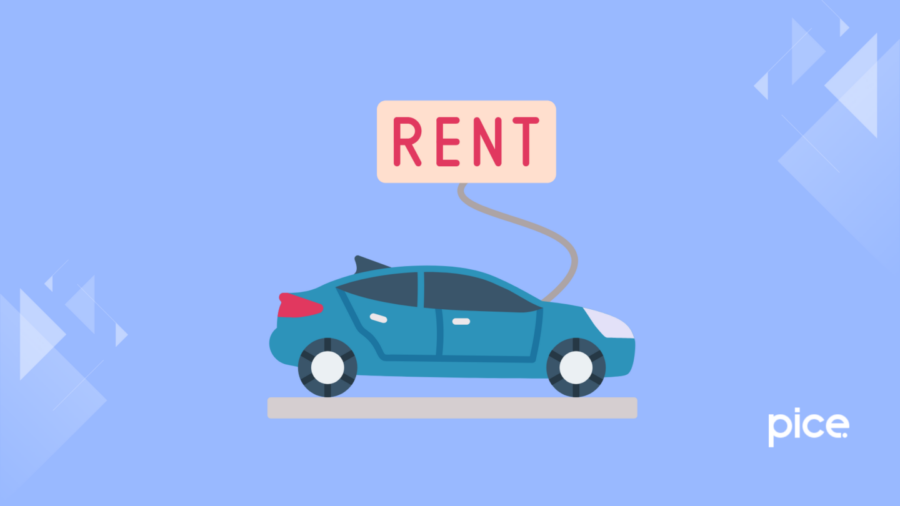GST on Car Lease
- 3 Sep 24
- 8 mins

GST on Car Lease
Key Takeaways
- Affordable Access: Car leasing offers low upfront costs and manageable monthly payments without full ownership.
- GST Variability: GST on car leases in India varies by fuel type and engine size, with electric vehicles enjoying the lowest rates.
- Corporate Perks: Salary-linked leasing policies provide employees with no down payments, tax savings, and easy car replacements.
- Inclusive Coverage: Leases often cover maintenance and insurance, reducing employee costs and hassles.
- Easy Approval: Leasing offers quicker, simpler approval compared to traditional auto loans.
In the automobile industry, leasing a car is often seen as a more financially feasible option instead of buying one outright. It opens a door to amazing advantages, letting you climb the financial growth ladder effortlessly.
To offer complete clarity about the Indian car leasing market, this overview will walk you through the current state of car leasing, rates of GST on car lease based on their fuel type and engine capacity, and benefits of corporate car leasing policy.
Handle all your sales and purchase invoices in one place.
Pice’s all-in-one invoice management tool helps you track, send, and organize invoices from a single dashboard. Automatically share new invoices with customers, send timely payment reminders, and keep your collections under control—effortlessly.
Want early access? Fill out this form to get request a demo!
What Is a Car Lease?

Car leasing mirrors the facility to enjoy the benefits of driving a car without fully committing to its ownership. The lessee becomes eligible to avail all services of having a car in exchange for monthly rentals. These monthly instalments include all the recurring costs including road taxes, insurance, maintenance expenses and more. There are two common types of leasing prevalent in India: operating and finance lease.
Current Market for a Car Lease
Due to its manifold advantages and demand for industrial and personal purposes, the global car leasing market is growing at a remarkable pace. An estimated 40% of the population in America and England favours a car on lease due to minimal upfront cost and lower monthly payments. Recent market research has indicated that the anticipated CAGR for the global car leasing market is all set to reach 7.2% from 2024 to 2033. It is predicted that in 2024, the market size will achieve a valuation of US$ 773,499.6 Million.
Maintaining the global parameters, the car leasing industry in India has been experiencing steady growth lately. This trend is the result of increasing awareness about the benefits of leasing a car and diversification of asset classes. Consequently, the market has seen the introduction of several companies to make the leasing process seamless.
The Indian leasing landscape has expanded from 40,000 units of cars per year to more than 60,000 units in 2023. Leasing penetration in India has reached 1.5% and could increase to 5-6% by the end of the decade, reaching around 250,000 to 300,000 units.
GST Rate on New Cars Lease in India - Petrol, Diesel, Electric Cars & SUVs
Find below the updated tabulated format illustrating the applicable rate of GST on car leases in India based on their fuel types and engine capacity, as per the 53rd GST Council meeting:
| Car Types | Fuel Types | Engine Capacity | Fuel Capacity | GST Rates | Compensation Cess |
| Small Cars | Petrol/ CNG/ LPG | <1200 CC | <4000 mm | 28% | 1% |
| Mid-Size Cars | >4000 mm | 28% | 15% | ||
| Large Engine Cars | 28% | 22% | |||
| Small Diesel Cars | Diesel | <1500 CC | <4000 mm | 28% | 3% |
| Mid-Size Diesel Cars | >4000 mm | 28% | 20% | ||
| Diesel SUV | >4000 mm | 28% | 22% | ||
| Electric Car | Battery | NA | NA | 5% | 0% |
| Fuel Cell Cars | Hydrogen Fuel Cell | NA | NA | 12% | 0% |
GST rates on used car leasing differ from the above-mentioned rates. The rate is classified into two slabs. There is a 12% tax rate for small petrol and diesel used cars and an 18% tax rate for mid-size and large petrol and diesel cars. Additionally, the compensation cess on these vehicles is 0%.
What Is the Purpose of a Salary-Linked Corporate Car Leasing Policy to Benefit Employees?
Encouraging the undeviating progress of car leasing, numerous firms are now embracing the salary-linked corporate car leasing policy. This policy entails a vehicle ownership model where employees select a car, and their employer deducts the monthly lease rental directly from their pre-tax salary.
To implement this policy, the company must partner with a car leasing company and conduct a credit evaluation. On approval, it can enforce a car leasing policy for its employees.
How Does Corporate Car Leasing Benefit Employees?
Car leasing is an effective way to provide employees with a vehicle, reducing their commuting stress. The following is a complete breakdown of all the advantages a car leasing policy brings to a firm:

- No Down Payment Required For Employees
Since the lease company serves as the primary owner of the vehicle, the lesse does not have to bear any down payment. All vehicular expenditures including road taxes, accessories and more are funded by the leasing company. This notably brings down the financial burden of employees while relishing all the benefits of having a motor vehicle.
- All Vehicles Experience Increased Maintenance & Repair Expenses
Since vehicles are subject to wear and tear, the maintenance expenses quickly add up, overburdening employees. In corporate car leasing, employees can avail either of the two types of leases: wet and dry. Under a wet lease, the maintenance cost is taken care of by the leasing company, whereas in dry leasing employees have to bear the cost.
- Easy Car Replacement
Car leasing also makes replacement easier. Employees can effortlessly replace their leased car at the time of renewal. Not only does it maximise comfort and safety, but also stays aligned with India’s Vehicle Scrappage Policy (2021). Under this policy, all vehicles that have been on the road for 15 years must undergo a fitness check. If failed, the vehicle will be discarded.
- Savings on Taxes
Car leasing also amplifies tax savings, making it a win-win situation for employees. Employees must use the leased motor vehicle for company-oriented purposes and enjoy 30% tax savings on fuel reimbursement costs, leasing amount, salary of driver and more.
- Easier Approval Compared to Auto Loans
The hefty paperwork of auto loans is frightening to many. Leasing makes that easier too! In corporate car leasing, you can get loan approval within 24 hours without bulky paperwork.
- Insurance Coverage For a Car Lease
Leasing also saves you from paying the car insurance premium. In the Indian leasing market, insurance coverage is included in the monthly rentals. The insurance offers coverage of all the maintenance and repair expenses for theft and accidents.
Conclusion
Leasing a car poses an array of impressive advantages, including reduced upfront costs, lower monthly payments and flexibility in usage. The introduction of GST on car lease in India has further enhanced these advantages by standardising tax rates on vehicles across the country, reducing complexity and effective tax burden on consumers.
With GST, leasing a car has become an even more appealing choice, providing individuals with a seamless and affordable way to drive their desired vehicle.
💡If you want to pay your GST with Credit Card, then download Pice Business Payment App. Pice is the one stop app for paying all your business expenses.
 By
By 

















